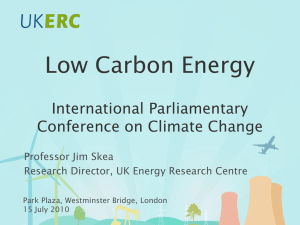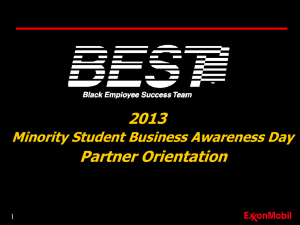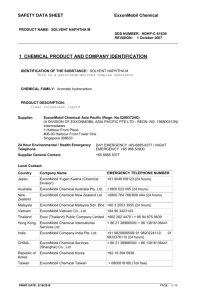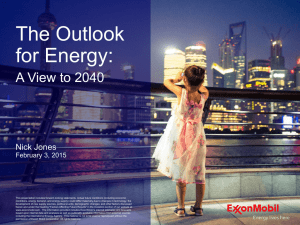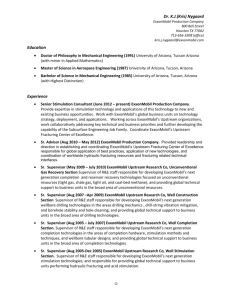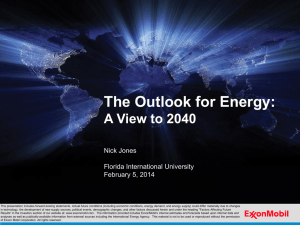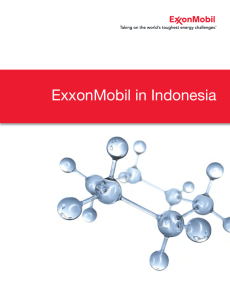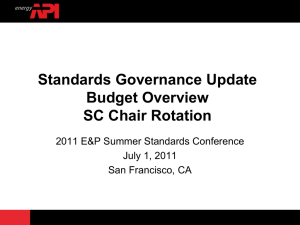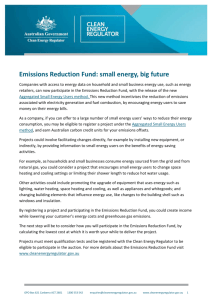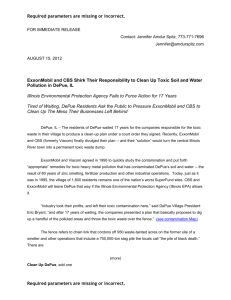a memo
advertisement
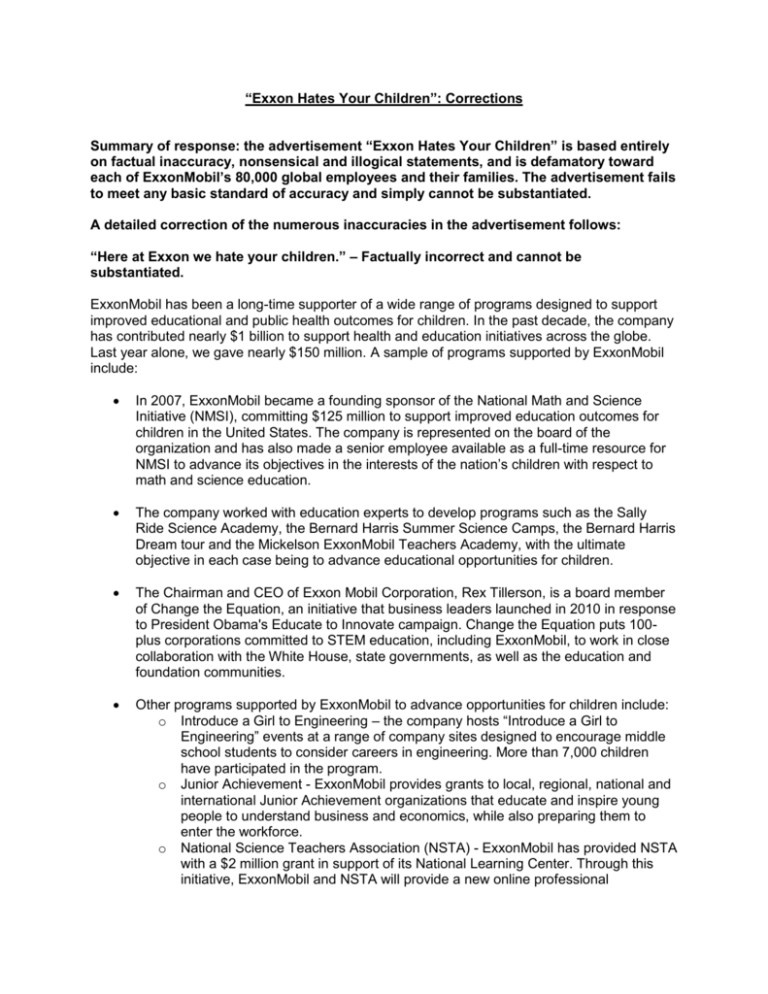
“Exxon Hates Your Children”: Corrections Summary of response: the advertisement “Exxon Hates Your Children” is based entirely on factual inaccuracy, nonsensical and illogical statements, and is defamatory toward each of ExxonMobil’s 80,000 global employees and their families. The advertisement fails to meet any basic standard of accuracy and simply cannot be substantiated. A detailed correction of the numerous inaccuracies in the advertisement follows: “Here at Exxon we hate your children.” – Factually incorrect and cannot be substantiated. ExxonMobil has been a long-time supporter of a wide range of programs designed to support improved educational and public health outcomes for children. In the past decade, the company has contributed nearly $1 billion to support health and education initiatives across the globe. Last year alone, we gave nearly $150 million. A sample of programs supported by ExxonMobil include: In 2007, ExxonMobil became a founding sponsor of the National Math and Science Initiative (NMSI), committing $125 million to support improved education outcomes for children in the United States. The company is represented on the board of the organization and has also made a senior employee available as a full-time resource for NMSI to advance its objectives in the interests of the nation’s children with respect to math and science education. The company worked with education experts to develop programs such as the Sally Ride Science Academy, the Bernard Harris Summer Science Camps, the Bernard Harris Dream tour and the Mickelson ExxonMobil Teachers Academy, with the ultimate objective in each case being to advance educational opportunities for children. The Chairman and CEO of Exxon Mobil Corporation, Rex Tillerson, is a board member of Change the Equation, an initiative that business leaders launched in 2010 in response to President Obama's Educate to Innovate campaign. Change the Equation puts 100plus corporations committed to STEM education, including ExxonMobil, to work in close collaboration with the White House, state governments, as well as the education and foundation communities. Other programs supported by ExxonMobil to advance opportunities for children include: o Introduce a Girl to Engineering – the company hosts “Introduce a Girl to Engineering” events at a range of company sites designed to encourage middle school students to consider careers in engineering. More than 7,000 children have participated in the program. o Junior Achievement - ExxonMobil provides grants to local, regional, national and international Junior Achievement organizations that educate and inspire young people to understand business and economics, while also preparing them to enter the workforce. o National Science Teachers Association (NSTA) - ExxonMobil has provided NSTA with a $2 million grant in support of its National Learning Center. Through this initiative, ExxonMobil and NSTA will provide a new online professional o o development program to upper elementary and middle school teachers in selected school districts. Reasoning Mind - Reasoning Mind is an innovative, Web-based math education program to actively engage middle school students in math. Science Ambassador Program - ExxonMobil employees participate in an in-class volunteer program focused on education in science, technology, engineering and mathematics targeted at middle school students. ExxonMobil is a global corporate leader in programs that seek to prevent and eradicate malaria. A significant component of the company’s support benefits children in developing countries. Since 2000, our anti-malaria program funding has exceeded $120 million, and has touched 83 million children and adults. Last year alone, ExxonMobil contributed more than $11 million to more than 20 organizations for 24 different projects, benefitting more than 16.7 million people in nine countries. Among a range of programs, ExxonMobil supports the Malaria Vaccine Initiative, which is working on the development and deployment of the RTS,S vaccine for infants and children. We also support the research and development of new drugs at the Medicines for Malaria Venture. The company also supports the Roll Back Malaria partnership, the UN Foundation’s Nothing But Nets programs, Jhpiego and USAID to combat malaria in Chad, Cameroon and Angola. The company was a significant supporter of American Idol’s Idol Gives Back philanthropic initiative, with a focus on supporting fundraising efforts for anti-malaria programs. ExxonMobil has donated approximately $14 million through Idol Gives Back, enabling the distribution of hundreds of thousands of bed nets throughout diseasestricken communities in Angola. “We all know the climate crisis will rip their world apart, we don’t care because it’s making us rich.” – Factually incorrect and cannot be substantiated. ExxonMobil’s position on the risks of climate change is clear: scientific evidence points to the fact that rising GHG emissions present risks to society and ecosystems—and that these risks warrant action by governments, companies and citizens. Reducing GHG emissions while expanding energy supply is one of the greatest challenges facing our industry and modern society. In 2011, the company invested $440 million to improve energy efficiency, reduce flaring, and reduce GHG emissions. We have improved energy efficiency by approximately 9 percent in refining and more than 12 percent in chemical manufacturing since 2002 (combined, improving 2 to 3 times faster than industry average). ExxonMobil is committed to taking action to reduce emissions in its own operations, to supporting the efficient use of energy by consumers, and to supporting scientific study and public policy debate on solutions: o Carbon Capture and Storage (CCS): ExxonMobil is a leader in the development and use of component technologies essential for CCS: “Controlled Freeze Zone” (CFZ): Committed more than $100 million for a U.S. demonstration project of CFZ, a technology that could more efficiently separate CO2 and other impurities from a natural gas stream and has the potential to lower the cost for separating and managing CO2. In 2010, we completed an $86 million expansion of our LaBarge facility, which has been capturing, transporting and selling CO2 since 1987. We participate in other major CCS projects including the Sleipner Field in Norway and the Gorgon CCS Project in Australia o Cogeneration: We have made major global investments in cogeneration technology, the simultaneous production of electricity and capture of heat to produce steam for manufacturing. This technology contributes to a significant reduction in CO2 emissions by maximizing energy resources within an operating plant and avoiding additional energy usage from the electricity grid: We have interests in more than 100 cogeneration facilities in more than 30 locations worldwide, with new facilities set to increase our capacity to more than 5,000 megawatts. o Gasification: Combined with CCS, gasification could reduce GHG emissions associated with coal. Gasification allows any carbon-based feedstock — coal, coke or biomass — to be converted into “synthesis gas” that can be used to produce electricity or converted into chemicals or transportation fuels. It produces a separate CO2 stream suitable for sub-surface storage. o Global Climate and Energy Project (GCEP): ExxonMobil is a founding sponsor of the Global Climate and Energy Project (GCEP) at Stanford University, a long-term science and engineering research effort. GCEP conducts fundamental, precommercial research to lay the foundations for energy options that reduce greenhouse gas emissions. o ExxonMobil was the only oil and gas company represented on the Intergovernmental Panel on Climate Change, and company scientists have contributed more than 40 peer-reviewed papers to scientific literature. o We support a range of globally-respected institutions in the areas of climate research and policy. These include the Massachusetts Institute of Technology, Stanford University, the Australian Bureau of Agricultural and Research Economics and Sciences, Battelle Pacific Northwest Laboratory, the Lamont Doherty Earth Observatory at Columbia University, the Brookings Institution, the American Enterprise Institute, the Council on Foreign Relations, Chatham House, Resources for the Future, and the Center for Strategic and International Studies. Exxon Mobil is the country’s largest supplier of natural gas, which has up to 60% fewer greenhouse gas emissions than coal. The United States is the world leader in reducing CO2 emissions, due in large part to the increased supply of natural gas, from companies such as ExxonMobil. ExxonMobil is an active and constructive contributor to public policy discussion on options to reduce greenhouse emissions. If governments consider the adoption of regulatory frameworks, we believe a well-designed, revenue-neutral carbon tax mechanism provides a cost-effective policy approach. When combined with further advances in energy efficiency and new technologies spurred by market innovation, a carbon tax could play a significant role in reducing GHG emissions. We publish detailed annual comparative data on the company’s performance in the areas of greenhouse gas emissions, energy intensity, cogeneration capacity and flaring. “That’s right every year Congress gives the Fossil Fuel Industry $10 billion in subsidies. That’s your tax dollars lining our pockets.” – Factually incorrect and cannot be substantiated. Neither ExxonMobil nor the U.S. oil and gas industry as a whole receives subsidies. The advertisement appears to be based on incorrect claims about legitimate tax provisions that apply to many organizations and many industries across the board. The oil and gas industry is, by any measure, a net contributor to economic growth and government revenue in the United States. Oil and gas companies created 9 percent of new U.S. jobs in 2011. With respect to revenue, the industry pays the federal government approximately $86 million a day – or about $31 billion a year – in rents, royalties, bonuses and corporate taxes. ExxonMobil is one of the most significant net contributors to U.S. government revenue and the economy. ExxonMobil’s direct contribution to the U.S. economy in 2012 was $68 billion, comprised of: Tax expenses of $12 billion Capital spending and operating expenses of $30 billion. $26 billion returned to U.S. shareholders in the form of dividends and share buybacks This direct contribution to the United States economy in 2012 was seven times higher than the $9.7 billion in U.S. earnings in 2012. “Making a fortune, destroying your kids’ future. At Exxon that’s what we call good business” – Factually incorrect and cannot be substantiated. ExxonMobil’s entire business model is focused on developing new resources of energy to meet future energy requirements over coming decades – when today’s children will be adults themselves. It is plainly nonsensical and illogical to claim that the company would do anything other than plan to supply the needs of future generations in what is a capitalintensive and inherently long-term business. In 2012, ExxonMobil invested a record $39.8 billion in capital and exploration expenditures to develop the resources that will supply the future needs of today’s children. ExxonMobil engages in significant research and review activities on future energy sources that may make a contribution to meeting the needs of future generations. The company has established a corporate-level Emerging Energy Sources and Technologies team (EMEST), tasked with evaluating technologies either over long time horizons, or in fields outside the company’s near-term business focus. Once EMEST determines that a technology is scalable from an energy supply-demand perspective, fits with ExxonMobil competencies, and meets economic criteria, the team can elect to evaluate or progress the technology in a functional research and development (R&D) program. The company’s orientation toward meeting the energy needs of future generations can be found clearly in our annual Outlook for Energy, which provides in substantial detail ExxonMobil’s expectations for population, economic and energy demand growth through to 2040.
